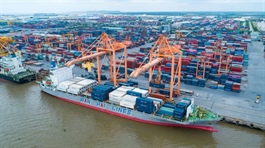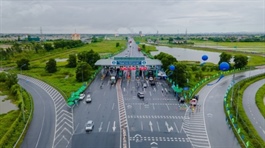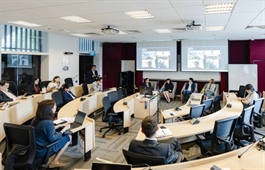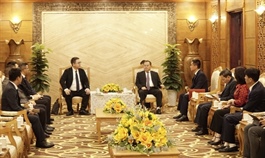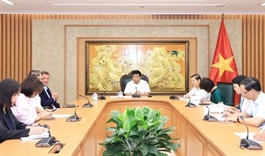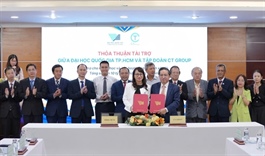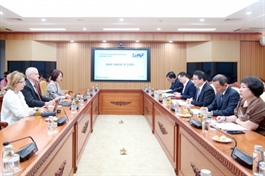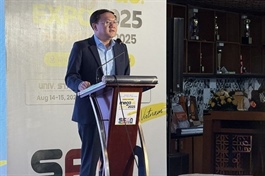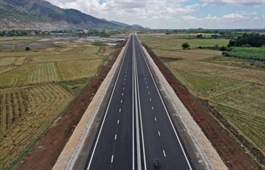Legal answers and enhanced competition to suit IP investors
Legal answers and enhanced competition to suit IP investors
Addressing legal obstacles related to investment and customs procedures for businesses operating in industrial areas will significantly enhance their competitiveness. This, in turn, will pave the way for attracting more foreign investment capital.

Nguyen Hong Chung, cice chairman, Vietnam Industrial Park Finance Association |
The government has been making concerted efforts to improve the investment and business environment. One such effort includes the issuance of resolutions like Resolution No.66/NQ-CP, which is specifically aimed at resolving legal difficulties in production and business activities. This reflects the state’s strong commitment to supporting the business community, which serves as the core driver of Vietnam’s economic growth and international integration.
In practice, although there have been improvements in the investment licensing process in many industrial parks, significant bottlenecks still persist. These challenges are primarily caused by overlapping regulations and extended processing times for critical procedures, which create serious hurdles for investors.
For example, inconsistencies and overlaps are evident across several key laws, including those on investment, land, construction, and environmental protection. These laws collectively govern the entire lifecycle of an investment project. However, the regulations concerning procedures, processes, and the relevant authorities are not synchronised or integrated.
As a result, processes such as the appraisal of investment policies under the Investment Law, assessments of land use demand under the Land Law, appraisals of basic design under the Law on Construction, and evaluations of environmental impact under the Law on Environmental Protection are often carried out independently. These evaluations lack coordination in terms of timing and content.
Consequently, investors are required to repeat certain steps, submit the same documents multiple times, or wait for each process to be approved sequentially. This significantly delays project implementation.
Regarding land access procedures, the determination of specific land prices through appraisal methods remains unclear and frequently delayed. This lack of clarity prevents investors from promptly meeting their financial obligations related to land, thereby hindering progress on subsequent project phases.
Customs procedures present another notable challenge for businesses. Although reforms have been introduced, additional improvements are still necessary to truly support enterprises. Inconsistent classification of goods and the ambiguous determination of HS codes often result in disputes and retroactive tax collections. These issues introduce unexpected legal and financial risks, particularly for businesses that import complex materials and machinery.
Moreover, specialised inspections continue to be hindered by overlapping regulations and insufficient coordination among ministries. These challenges contribute to delays at customs, which in turn increase storage costs, generate unnecessary expenses, and reduce the competitiveness of businesses within global supply chains.
To address these issues and further enhance the investment and business environment, we propose several policy recommendations.
Firstly, it is essential to enhance and synchronise the legal framework. This can be achieved by urgently reviewing, amending, and supplementing relevant laws, decrees, and circulars to ensure consistency, transparency, and coherence. Particular attention should be paid to harmonising the laws on Investment, Land, Construction, and Environmental Protection.
The ultimate goal is to establish an integrated process that reduces the processing time required for investors. Clear, detailed, and easy-to-understand guidelines should be issued to eliminate vague regulations that could lead to disputes in practice.
Additionally, an easily accessible, and regularly updated national legal database should be developed, enabling businesses to access accurate information regarding investment and business regulations.
Secondly, there should be continued reform of administrative procedures and acceleration of digital transformation. This includes reducing unnecessary administrative processes, particularly by shortening processing times for land-related matters such as land clearance and land price determination, as well as for construction procedures like design appraisal and licensing. Strict and transparent mechanisms should be put in place to monitor and publicise the timelines for these processes.
The application of IT should be expanded to digitise the entire procedure for receiving and processing applications, thereby improving transparency and minimising direct contact between businesses and public officials. Furthermore, an effective one-stop shop mechanism should be established at the management boards of industrial and economic zones. Businesses should be able to submit a single set of documents to address multiple related procedures.
Thirdly, tax and customs policies should be reviewed and refined. Regulations regarding eligibility for tax incentives need to be clarified to prevent differing interpretations and to ensure policy stability and predictability, thereby reassuring investors.
Procedures for VAT refunds should be simplified, and the processing time for these refunds should be shortened to support businesses’ cash flow. This is particularly important for large-scale projects, as it enables reinvestment and expansion of production. The modernisation of customs procedures should also continue, with the aim of maximising facilitation for businesses.
Regulations related to specialised inspections should be reviewed to allow for the establishment of a single inspection authority or to facilitate mutual recognition of inspection results. This will help reduce both the time and costs incurred by businesses. In addition, the rules governing the import of used machinery and equipment should be made more flexible, while still ensuring compliance with standards of quality, technology, and environmental protection that meet the practical needs of businesses.
Equally important is the need to strengthen dialogue, improve responsiveness to business concerns, and enhance the capacity of public officials. Substantive public-private dialogues should be further promoted, enabling authorities and the business community to jointly address emerging challenges at the grassroots level.
Finally, transparent, efficient, and open communication channels should be established to allow businesses to submit feedback and recommendations. These inputs should be reviewed and addressed promptly and constructively.
- 10:40 24/07/2025







